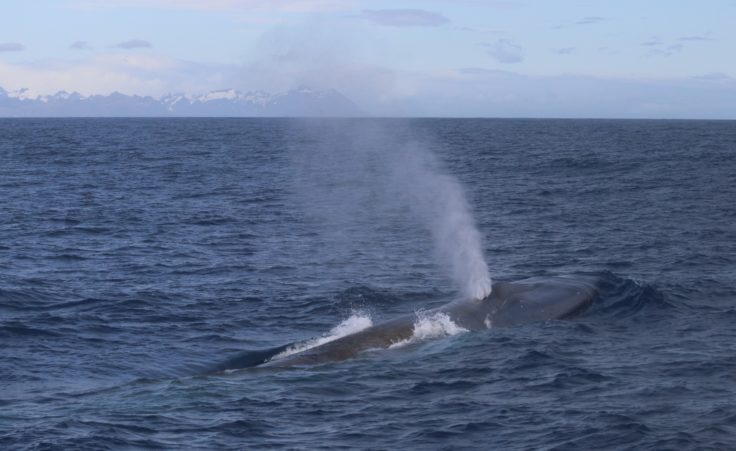Global S&T Development Trend Analysis Platform of Resources and Environment
| Blue whales return to South Georgia after near extinction | |
| admin | |
| 2020-11-19 | |
| 发布年 | 2020 |
| 语种 | 英语 |
| 国家 | 英国 |
| 领域 | 资源环境 |
| 正文(英文) | An international research team led by UK scientists has revealed the return of critically endangered Antarctic blue whales to the sub-Antarctic island of South Georgia, 50 years after whaling all but wiped them out. The new study follows recent research that humpback whales are also returning to the region. The discovery, based on analysis of 30 years’ worth of sightings, photographs and underwater sound recordings, is crucial evidence in learning how the species is recovering following a ban on commercial whaling in the 1960s. The findings are published today (19 November) in the journal Endangered Species Research.  Blue whales were abundant off South Georgia before early 20th century industrial whaling between 1904 and 1971 killed 42,698 of them there. Most of these were killed before the mid-1930s. The species all but vanished from the region – dedicated whale surveys from ships off South Georgia resulted in only a single blue whale sighting between 1998 and 2018 – but more recent surveys suggest blue whales are making a comeback. A 2020 survey in February resulted in 58 blue whale sightings, and numerous acoustic detections.
As well as looking for whales, the researchers used listening devices, which can detect the loud, low frequency calls of whales over long distances and can also work in rough weather. The team also had records of whale sightings reported to the South Georgia Museum by mariners and tourist ship passengers, and photographs of blue whales, which enable individual animals to be identified. In total, 41 blue whales have been photo-identified from South Georgia between 2011 and 2020, although none of these matched the 517 whales in the current Antarctic blue whale photographic catalogue. Susannah Calderan added: “We don’t quite know why it has taken the blue whales so long to come back. It may be that so many of them were killed at South Georgia that there was a loss of cultural memory in the population that the area was a foraging ground, and that it is only now being rediscovered.” There are limited opportunities for dedicated whale surveys in the region, known for its harsh weather and inaccessibility but such surveys are crucial to the future management of South Georgia’s seas.
The team’s analysis was funded by South Georgia Heritage Trust and Friends of South Georgia Island, who also funded the collection of some of the data used. Acoustic and sightings data come from expeditions led by British Antarctic Survey, with funding from the Darwin Initiative and EU BEST; from the Swiss Polar Institute Antarctic Circumnavigation Expedition (funded by the ACE Foundation, Ferring Pharmaceuticals and the Australian Antarctic Division), and Government of South Georgia and South Sandwich Islands. This international collaboration includes scientists from the SAMS, BAS, Australian Antarctic Division, US NOAA, International Fund for Animal Welfare, Government of South Georgia and South Sandwich Islands, South Georgia Heritage Trust, University of Washington, Texas A&M University at Galveston, Woods Hole Oceanographic Institution. South Georgia blue whales five decades after the end of whaling by Susannah V. Calderan, Andy Black, Trevor A. Branch, Martin A. Collins, Natalie Kelly, Russell Leaper, Sarah Lurcock, Brian S. Miller, Michael Moore, Paula A. Olson, Ana Širović, Andrew G. Wood, Jennifer A. Jackson is published in the journal Endangered Species Research: https://www.int-res.com/abstracts/esr/v43/p359-373/
|
| URL | 查看原文 |
| 来源平台 | British Antarctic Survey |
| 文献类型 | 新闻 |
| 条目标识符 | http://119.78.100.173/C666/handle/2XK7JSWQ/304718 |
| 专题 | 资源环境科学 |
| 推荐引用方式 GB/T 7714 | admin. Blue whales return to South Georgia after near extinction. 2020. |
| 条目包含的文件 | 条目无相关文件。 | |||||
| 个性服务 |
| 推荐该条目 |
| 保存到收藏夹 |
| 查看访问统计 |
| 导出为Endnote文件 |
| 谷歌学术 |
| 谷歌学术中相似的文章 |
| [admin]的文章 |
| 百度学术 |
| 百度学术中相似的文章 |
| [admin]的文章 |
| 必应学术 |
| 必应学术中相似的文章 |
| [admin]的文章 |
| 相关权益政策 |
| 暂无数据 |
| 收藏/分享 |
除非特别说明,本系统中所有内容都受版权保护,并保留所有权利。
修改评论